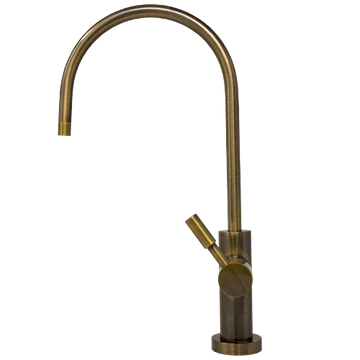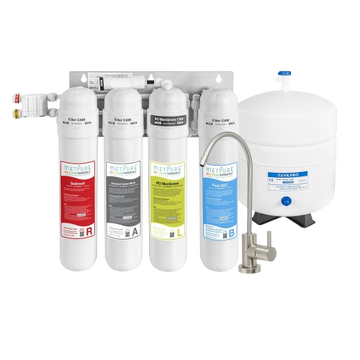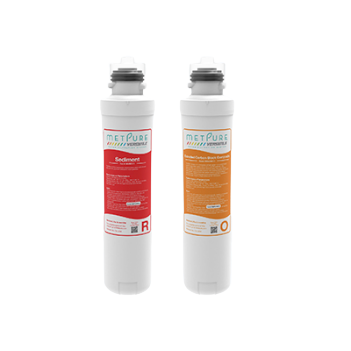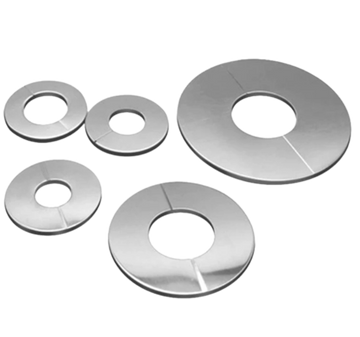Refrigerators today typically come with water and air filters, features often overlooked until issues arise like spoiled food, odd-tasting water, or unpleasant odors when the fridge door is opened.
However, understanding the efficacy of these filters is crucial. In this article, we delve into fridge filters, how they work, and which fridge filter we recommend.
What is a Fridge Water Filter?
A fridge or refrigerator filter works to purify the water dispensed from the fridge. Although the term "refrigerator filter" encompasses both water and air filters, it commonly refers to water filtration systems.
These filters effectively eliminate unpleasant tastes and odors from water. Water filters are housed at various locations depending on the refrigerator model and enhance the taste and smell of tap water by eliminating added chemicals.
How do Fridge Water Filters work?
Fridge water filters employ a dual filtration method involving sediment and activated carbon to eliminate water contaminants like lead, chlorine, and volatile organic compounds (VOCs). Among these, lead and VOCs are subject to EPA regulations, mandating their levels in tap water to fall below specific thresholds. Chlorine, conversely, is intentionally added to tap water for microbial sterilization but often imparts an unpleasant taste and odor. Fridge water filters are crucial in removing these undesirable contaminants from tap water.
Is Fridge Water Safe to Drink?
If your fridge is connected to city-treated water and the water quality remains uncompromised, it is generally safe to drink the fridge water. However, during a boil water advisory, it's essential not to consume or use water from the fridge dispenser without first boiling it. For those receiving water from a well, ensuring the safety of fridge water for drinking or cooking necessitates the installation of a suitable whole-house water treatment system.
Do Fridge Filters Work?
Fridge water filters indeed work well in removing specific contaminants they are made to target. However, if your objective is to thoroughly purify water by eliminating as many impurities as possible, a refrigerator water filter may not be enough. These filters primarily focus on enhancing the taste of tap water by eliminating unpleasant flavors. For more comprehensive filtration, other water filtration systems would be necessary.
Benefits of Fridge Water Filters
Fridge water filters have many benefits over other water filters and filtration systems.
- Easy to manage: Fridge water filters only require replacement every six months, allowing you to enjoy filtered water from your refrigerator whenever you want.
- Good flow rate: Unlike some filtration systems like reverse osmosis, fridge water filters maintain a high flow rate, filtering water as quickly as it is dispensed from the refrigerator.
- Better taste: Designed to enhance water quality, fridge water filters deliver crisp and clear-tasting water.
- Cost-effective: Typically priced between $30 to $50, fridge filters are relatively inexpensive. With replacements twice a year, they cost almost $60 to $100 a year.
- Save space: As fridges come with dedicated housing for water filters, fridge water filters do not occupy usable space.
- Easy replacement: Replacing a fridge water filter is simple, just twist out the old filter, insert the new one, and flush the system.
- Ice filtration: In addition to filtering drinking water, refrigerator water filters also purify water used for making ice.
Issues with Fridge Water Filters
While fridge filters have many benefits, they have some downsides as well including:
- Fridge water filters have limitations in treating numerous contaminants. Unlike filtration systems like reverse osmosis, which can target a wide range of impurities, fridge filters may not be sufficient for highly contaminated water sources.
- Additionally, fridge filters can become clogged over time. To prevent this, it's essential to adhere to the recommended six-month filter replacement schedule.
Which Fridge Water Filter Should You Buy: Our Recommendation
While there are many options for fridge water filters in the market, we suggest getting the Metpure Quick Twist Water Filter Complete Icemaker Kit MVCTO11-KIT.
Why? Here are a few reasons:
- Great Tasting Water: This filter is made with virgin coconut granulated activated carbon that is specifically made to reduce chlorine, improve taste, and eliminate odor from your water.
- Versatility: The slim twist filter is designed to be hung on a surface vertically and can be placed right behind a refrigerator, next to a water fountain, or a coffee maker, or simply hidden inside a sink cabinet. It is great for a wide variety of applications. Connect to a water source and hook the filter up to your refrigerator, ice maker, coffee brewer, humidifier, water dispenser, drinking fountain, and many more.
- High Capacity: Compared to typical in-fridge cartridges that only last up to 6 months, this filter can last up to 12 months or 1500 gallons.
- Quick Filter Cartridge Replacement: Just twist the filter and replace it in less than 5 seconds. Metpure Versatile filter requires no tools to replace and no need to shut off water during filter change due to the patented built-in compression valve in the manifold CAM. You will appreciate this much more than the traditional inline filter.
Conclusion
We hope this article helped you understand how fridge filters work, what are its benefits, and what may be some issues with this type of filter.
Overall, if you plan on getting a good fridge water filter, we recommend the Metpure Quick Twist Water Filter designed specifically for refrigerators with activated carbon that provides you with better-tasting water.
For more such informative articles, keep following the Metpure blog.















